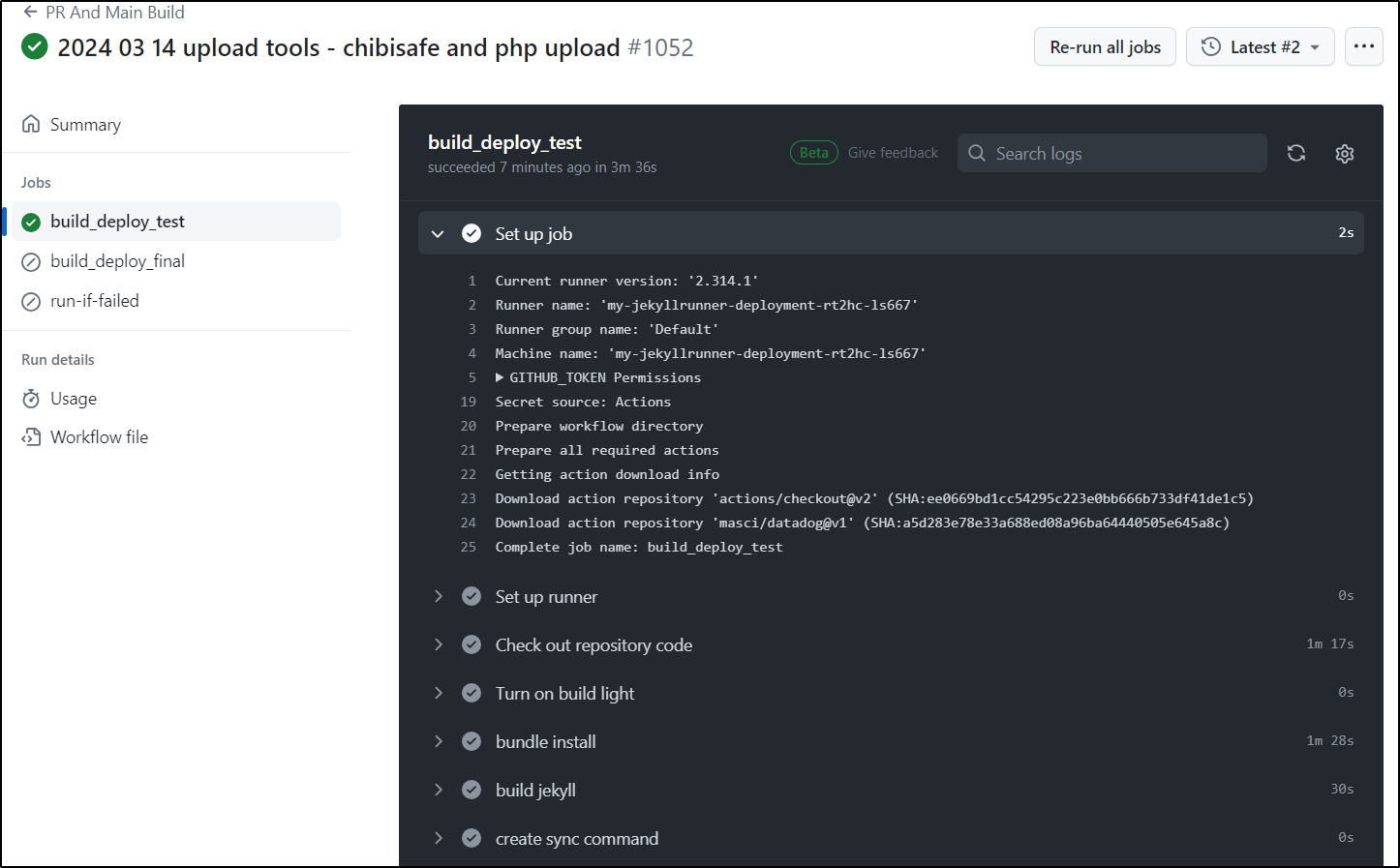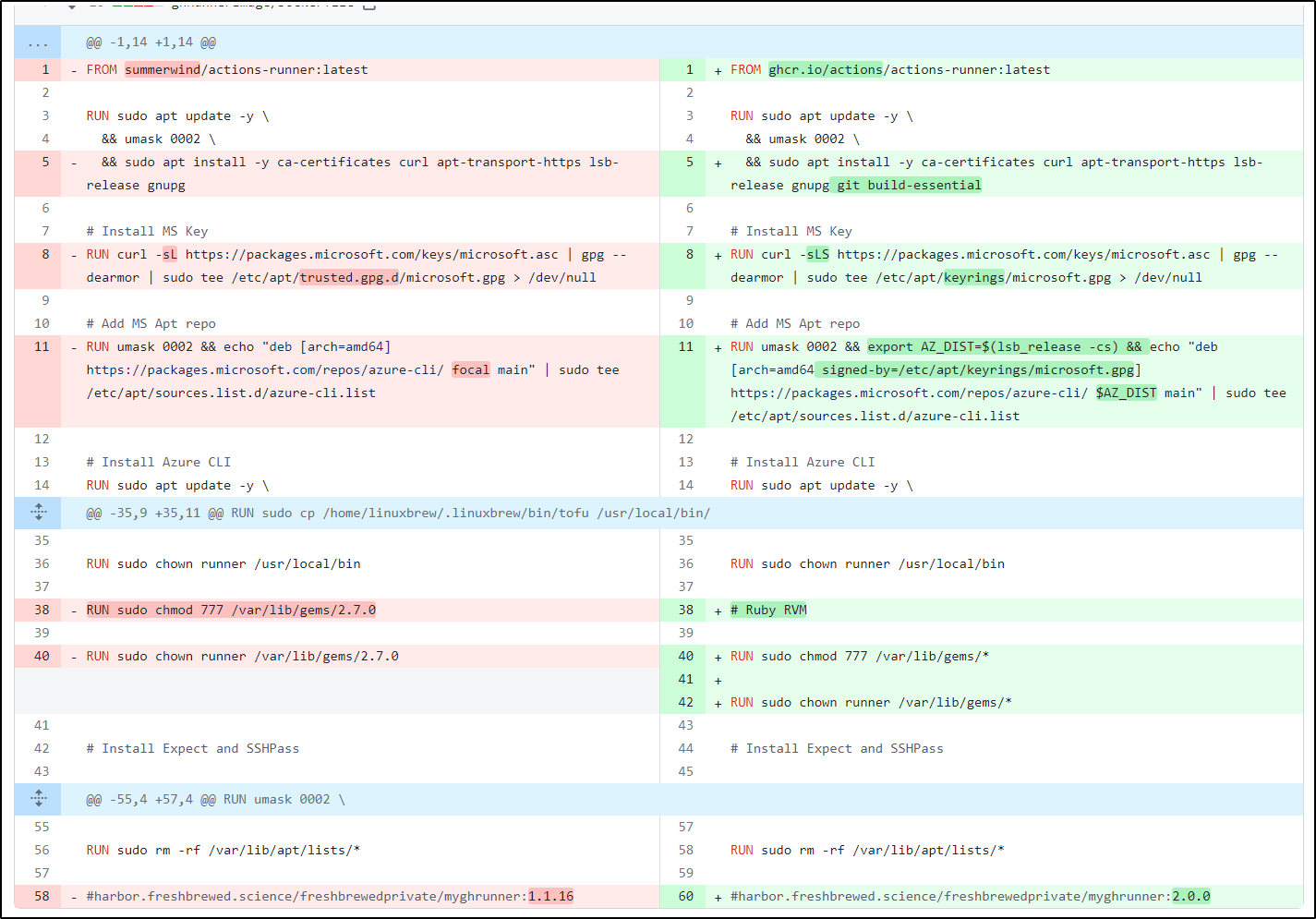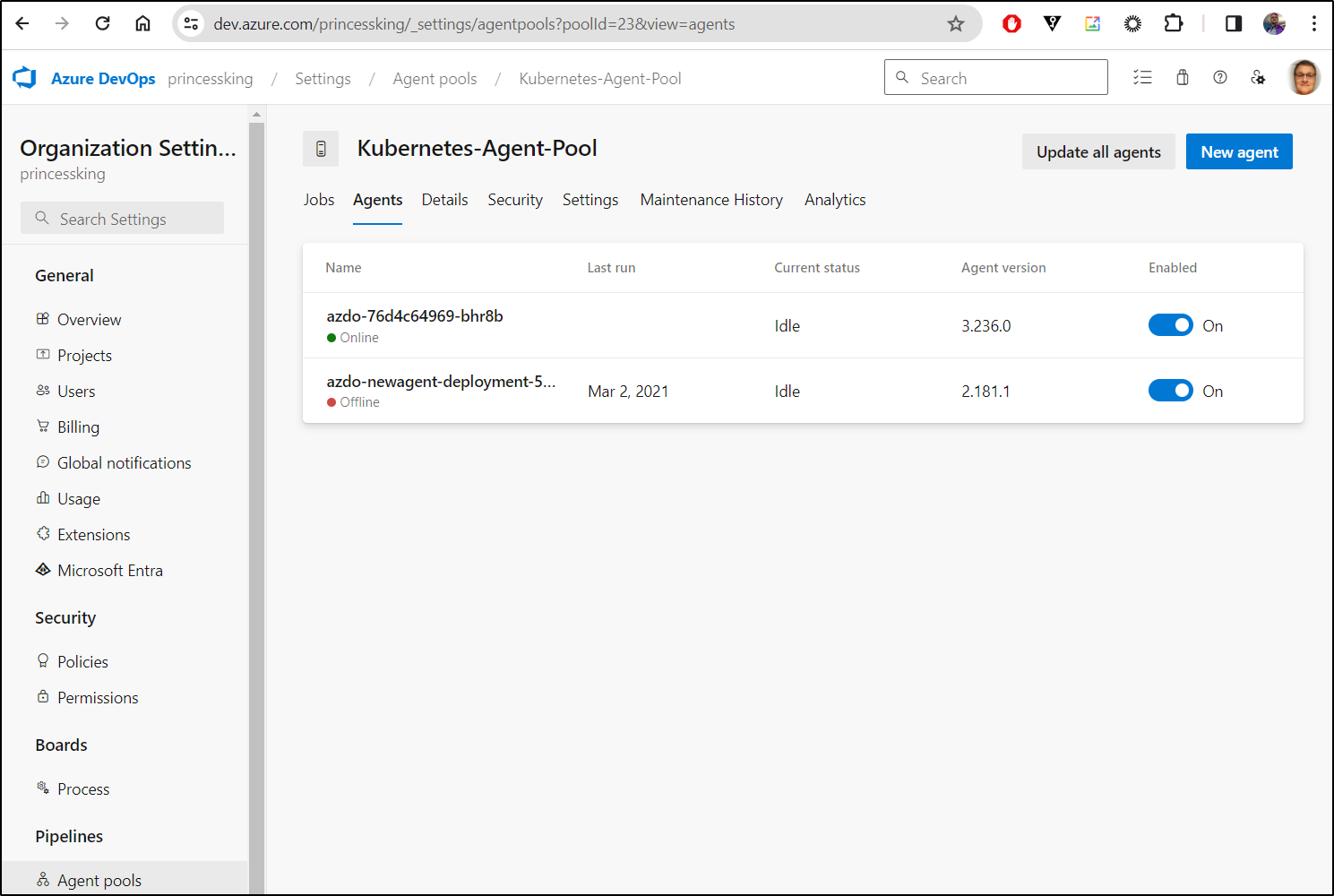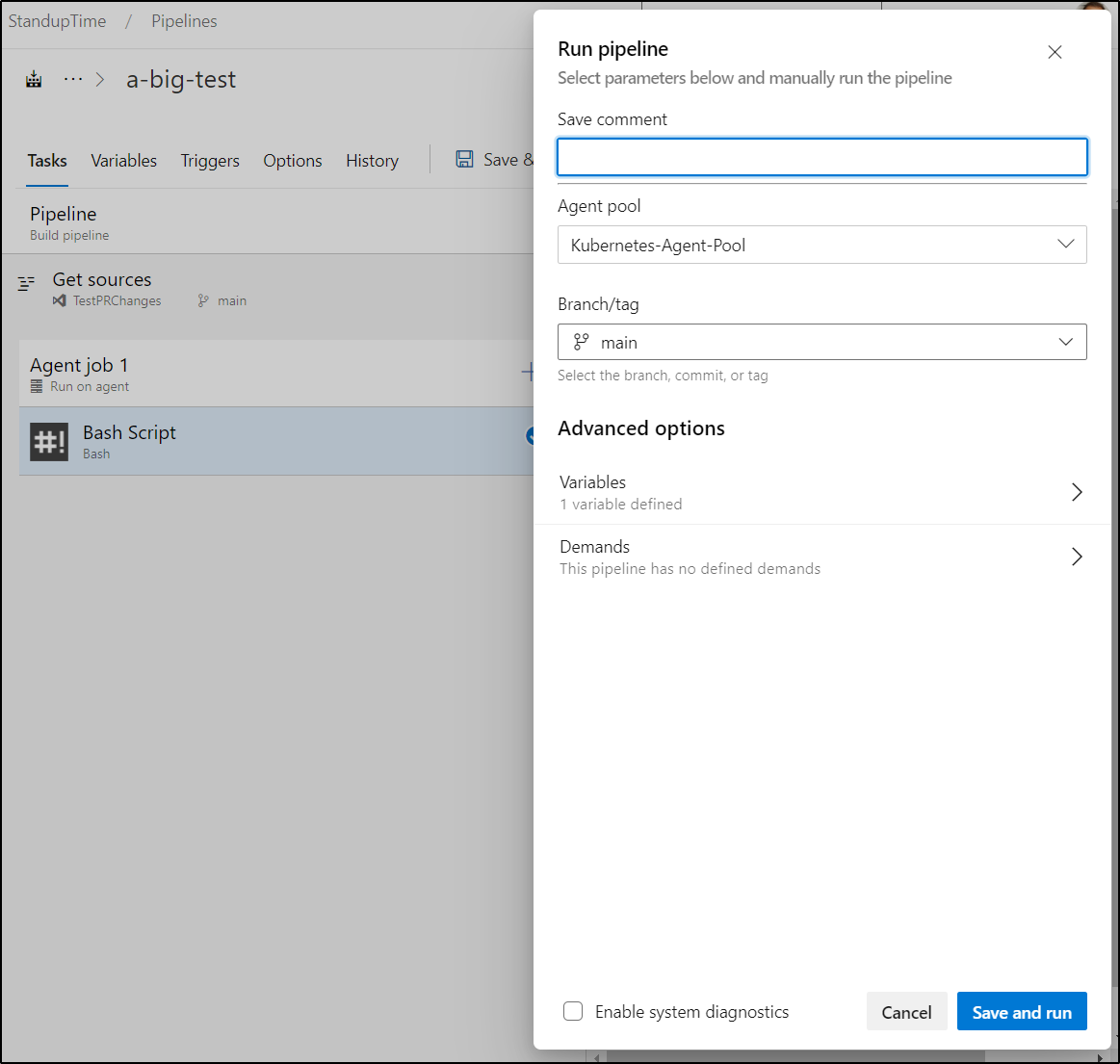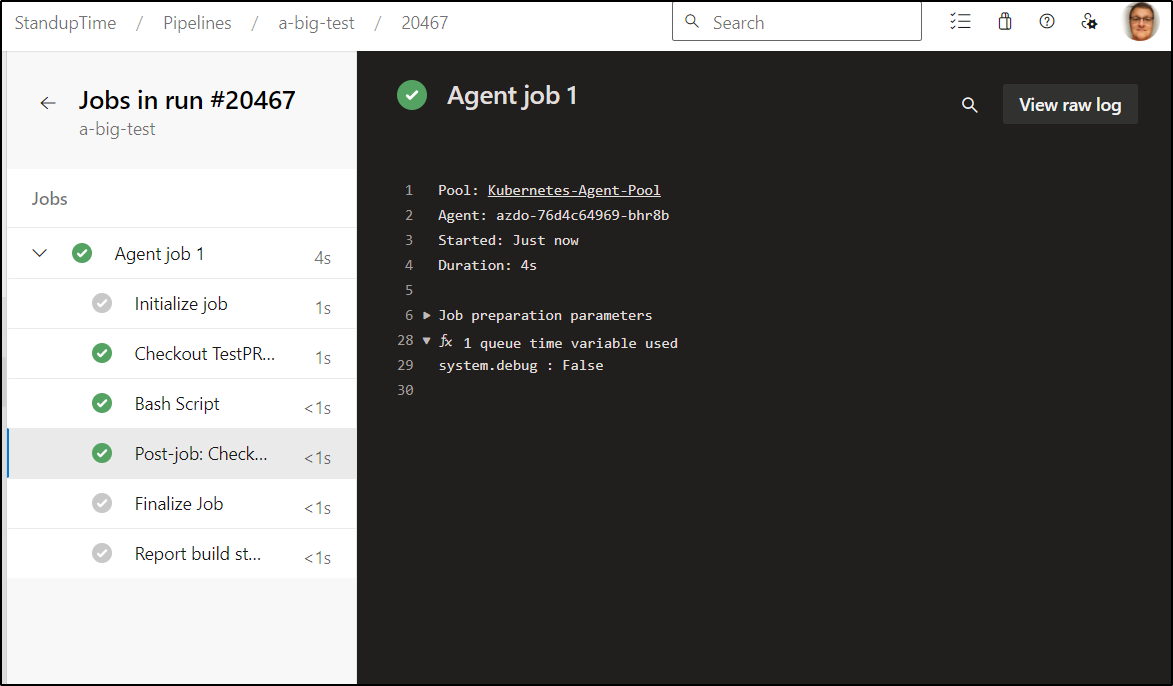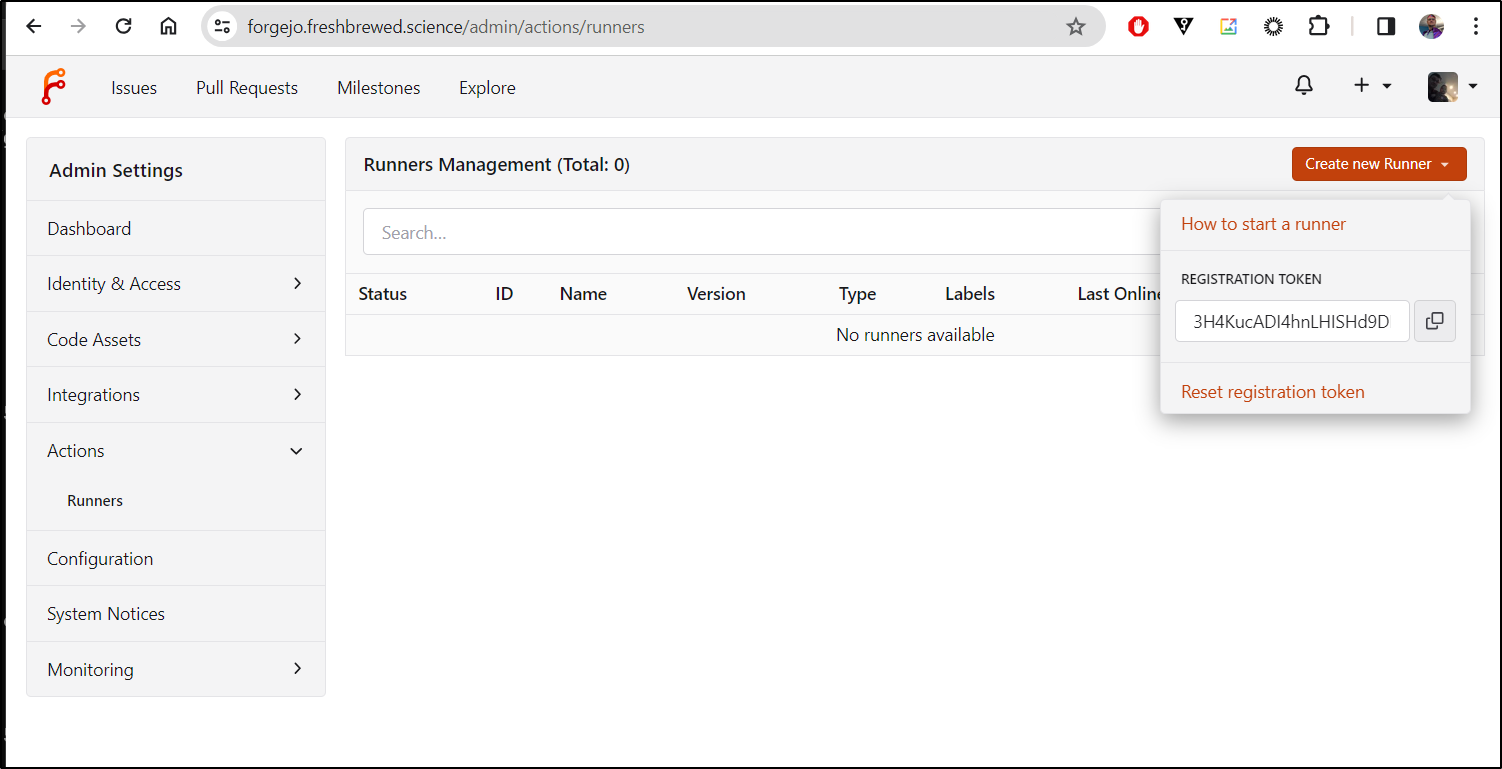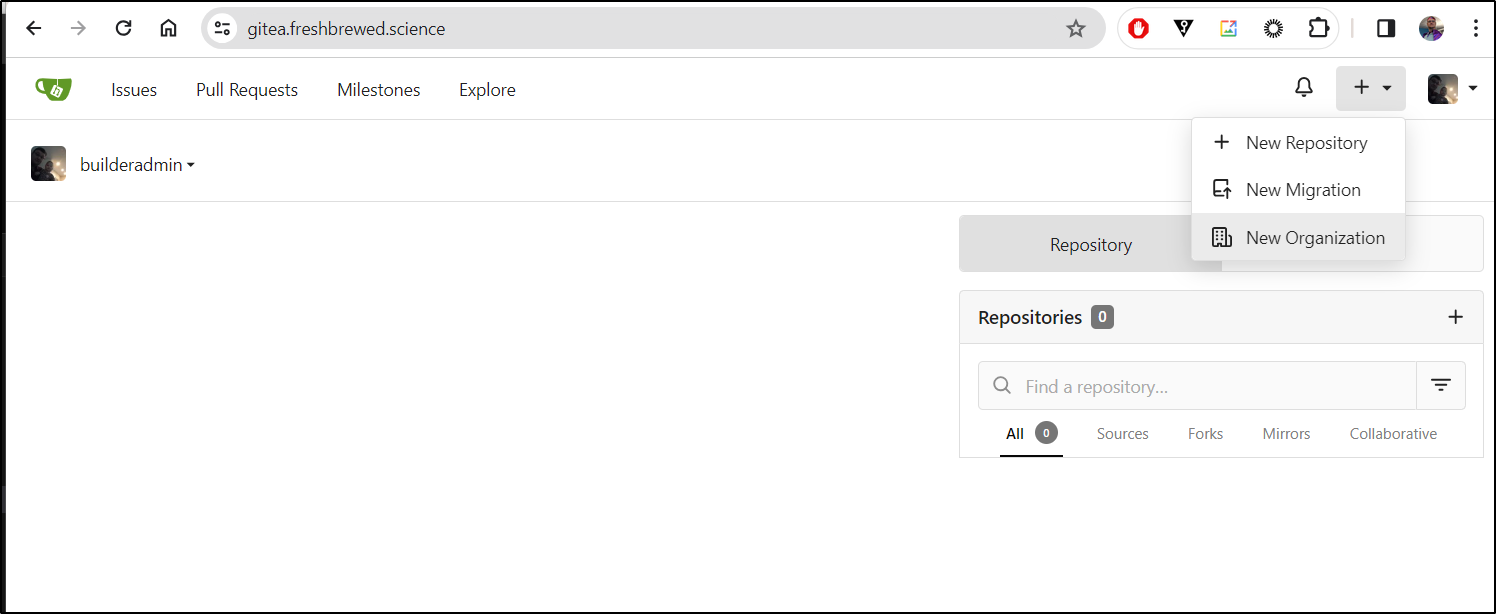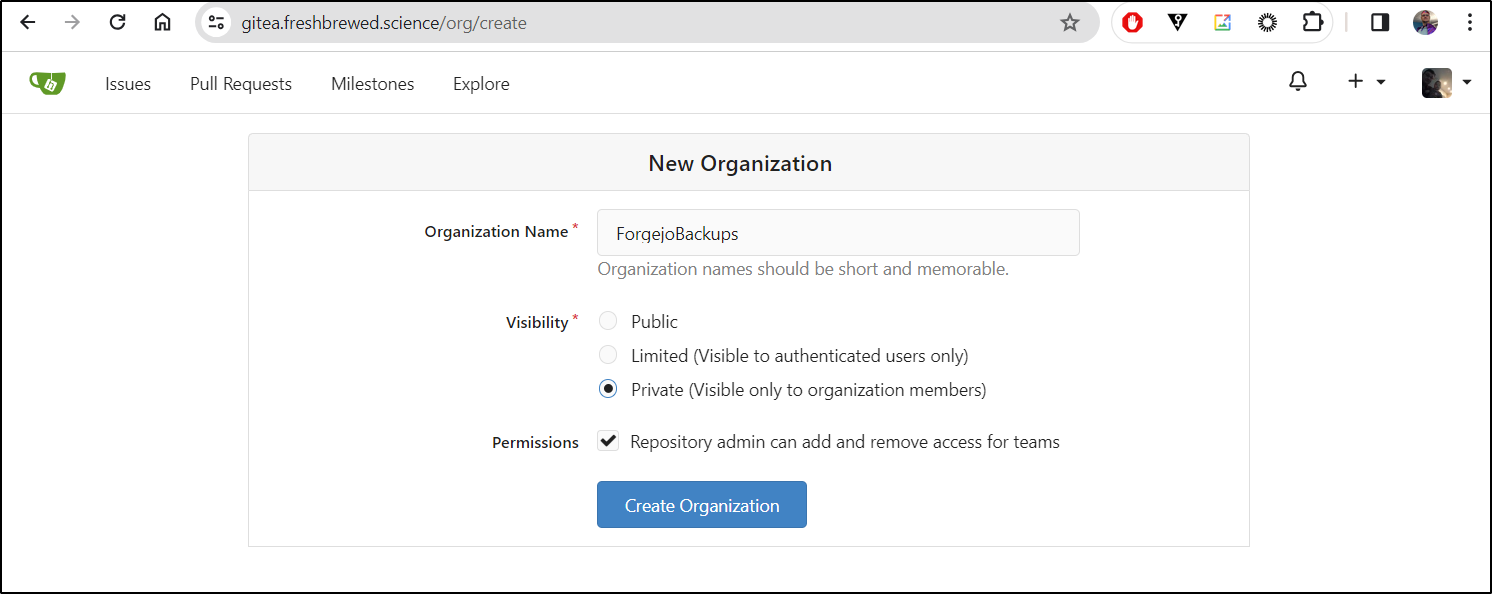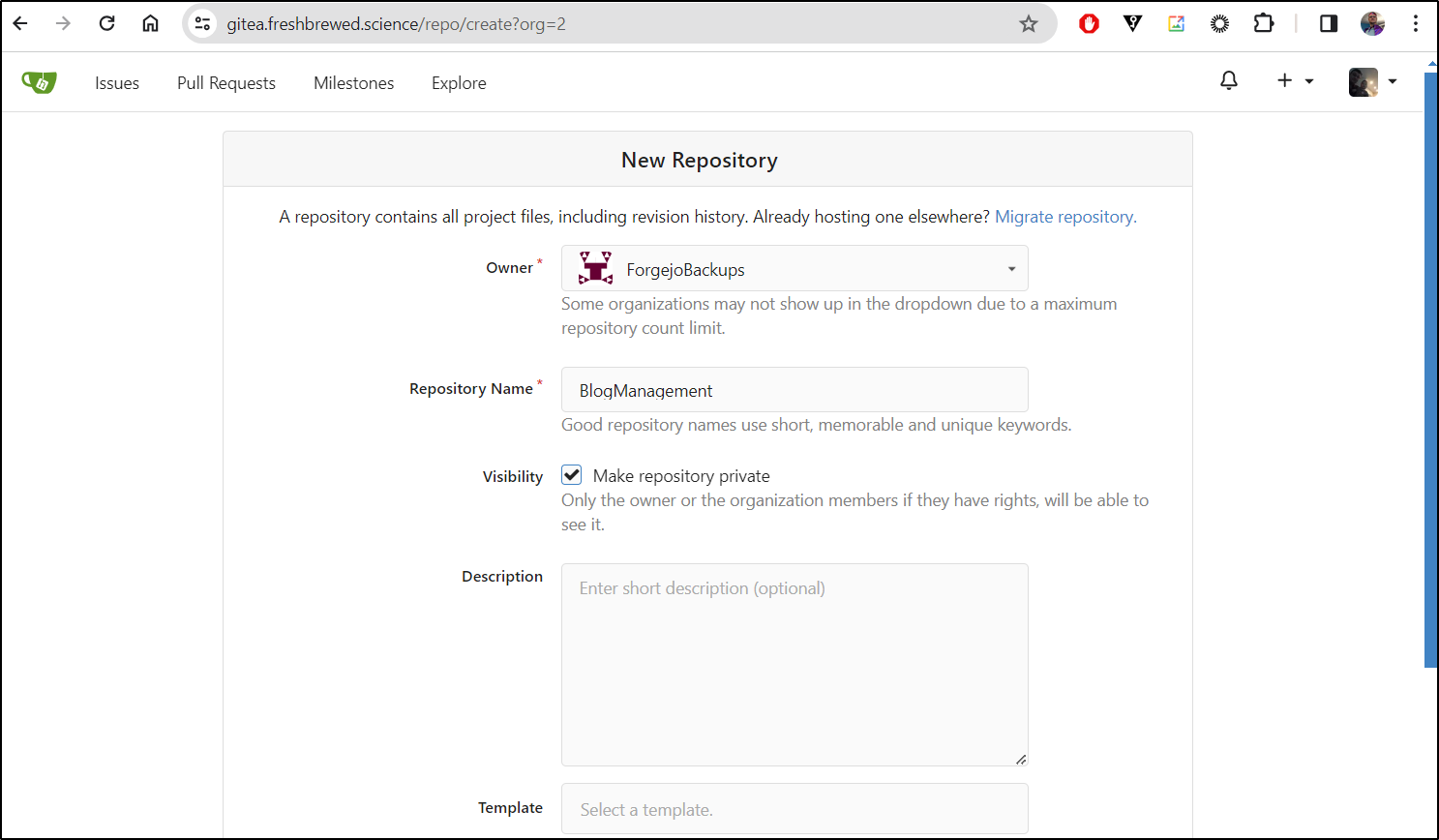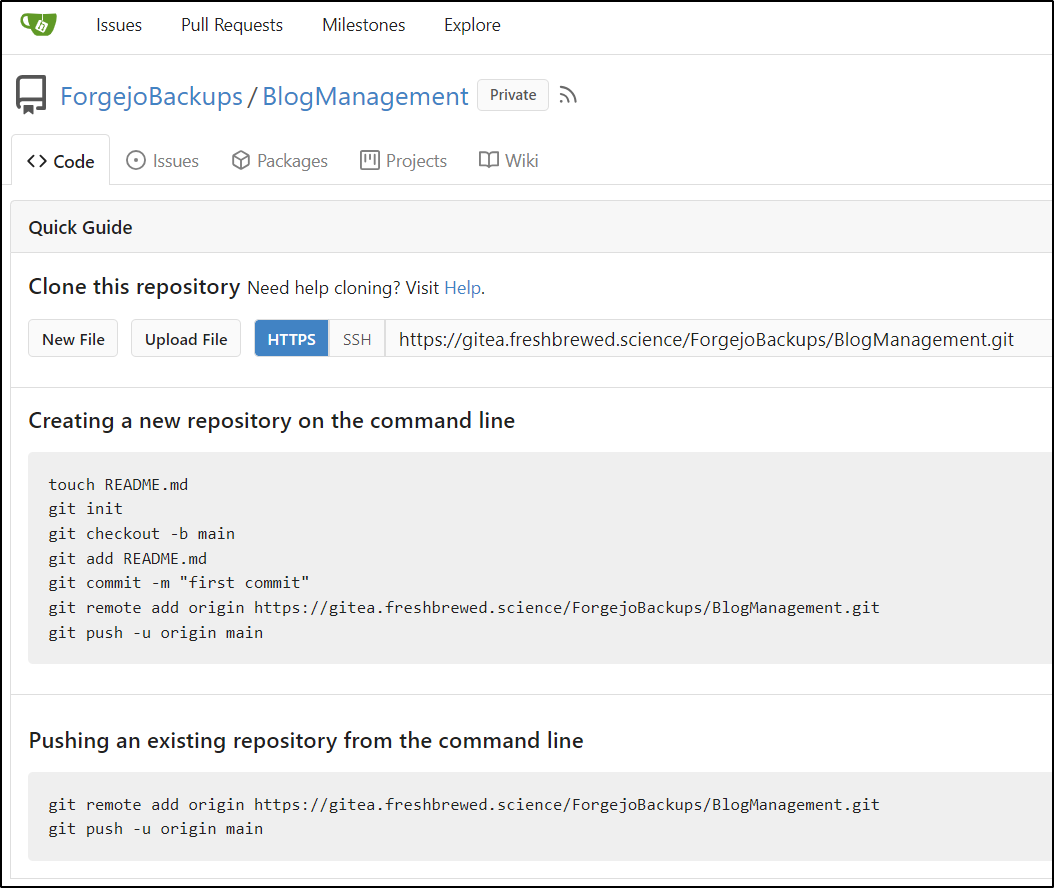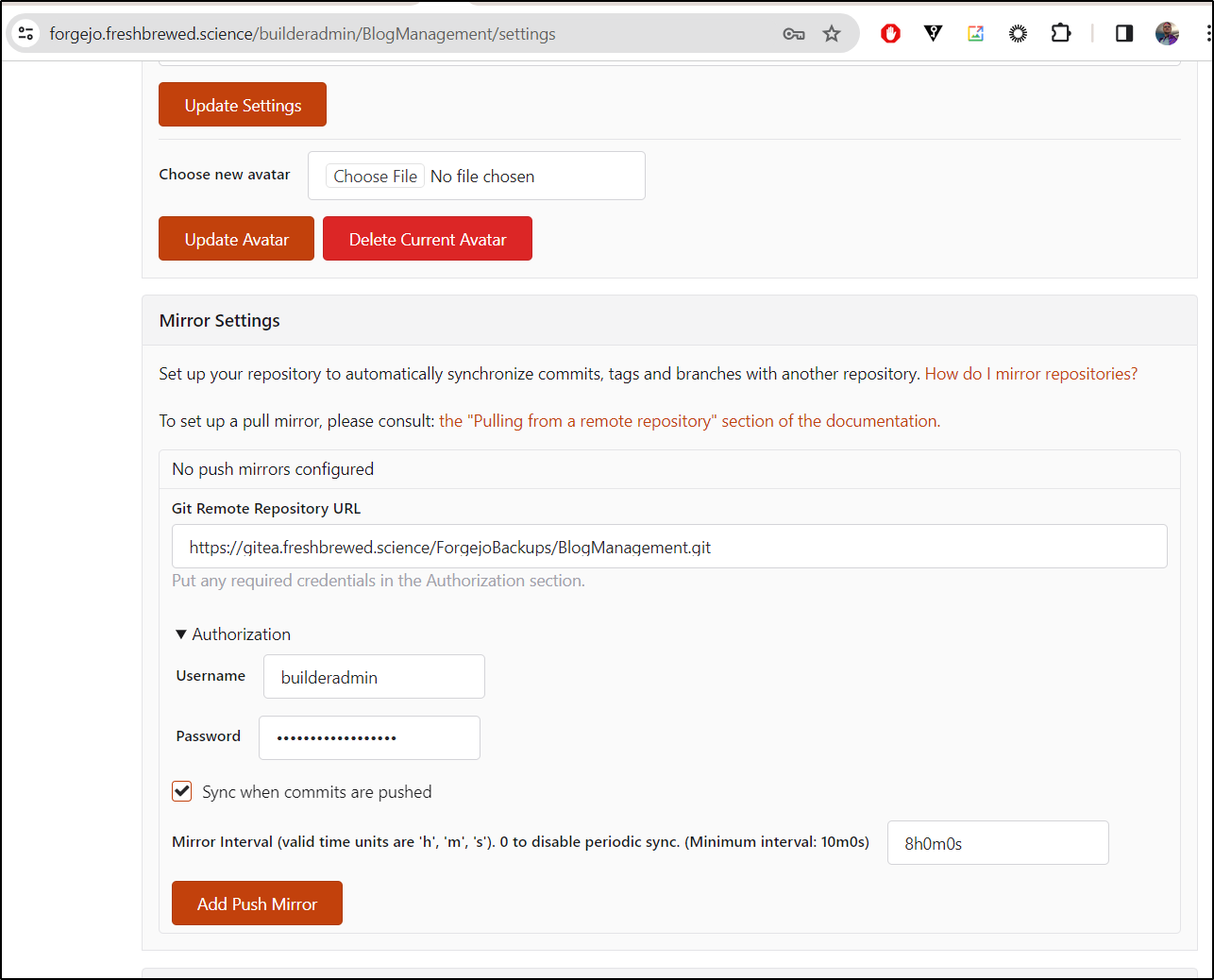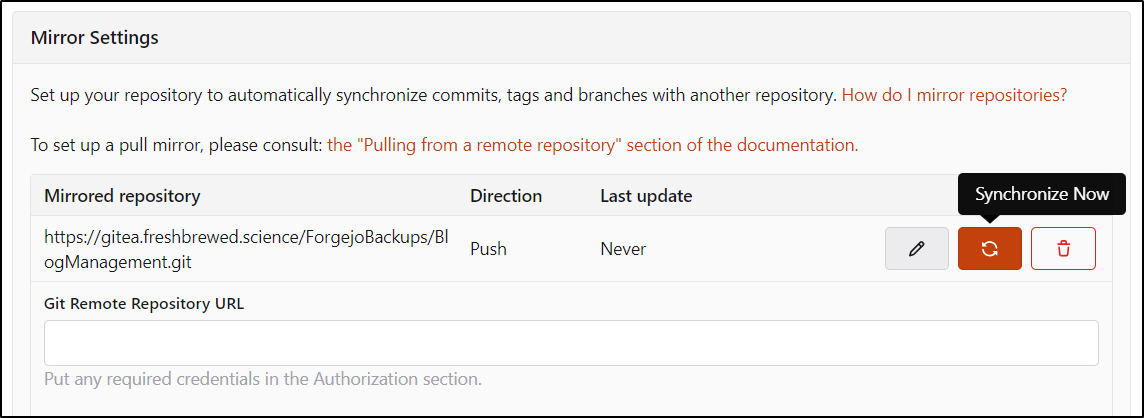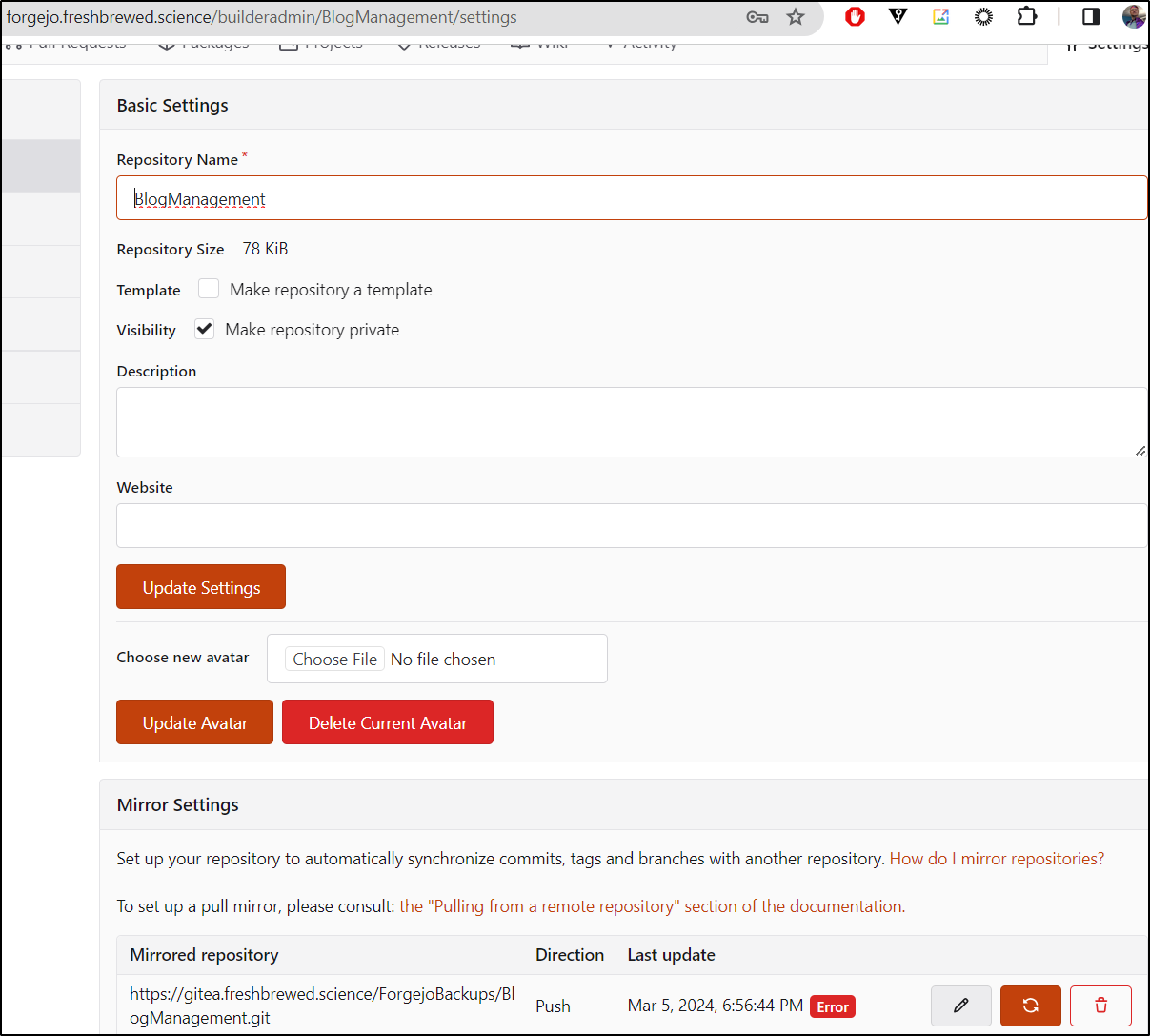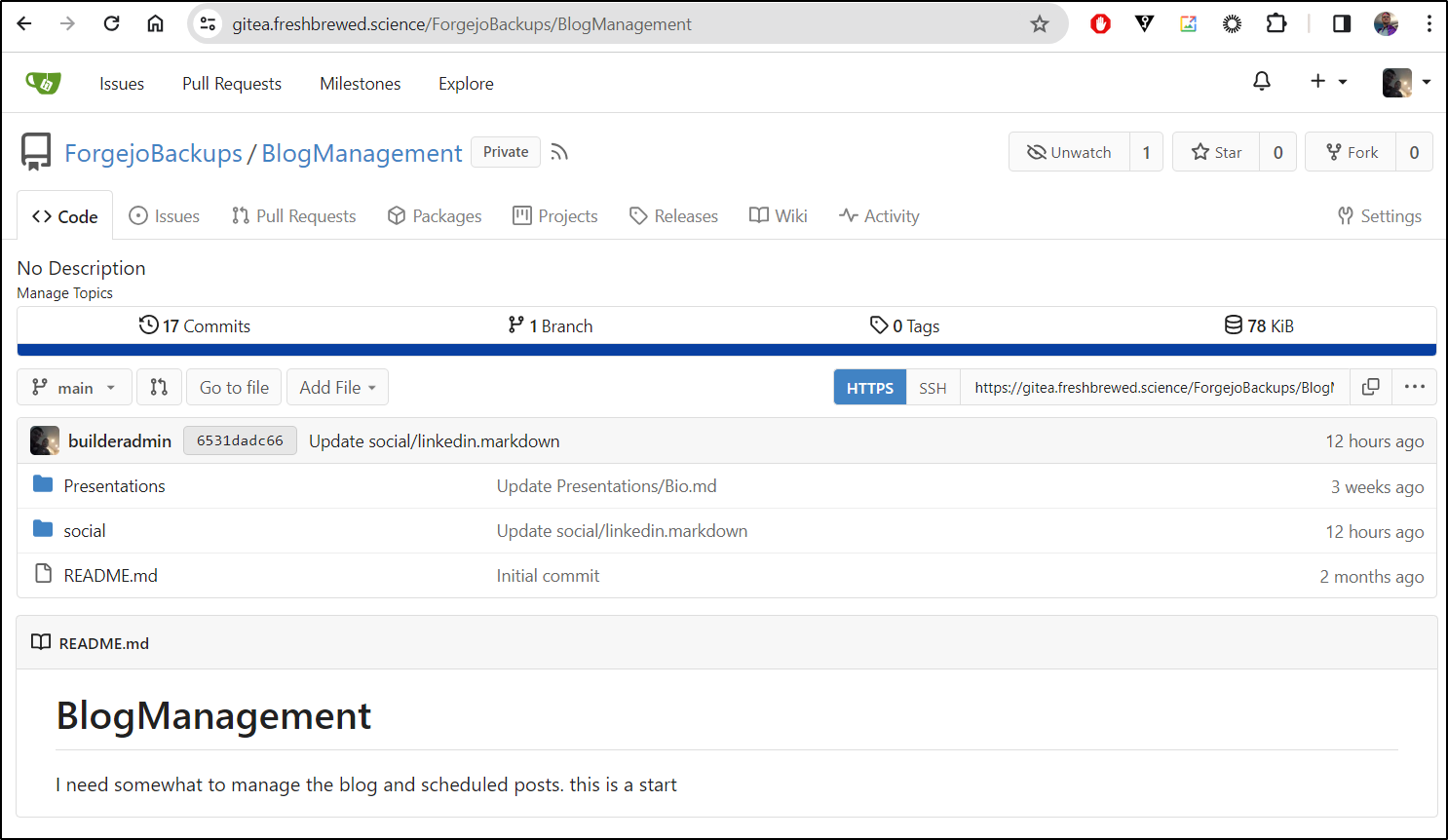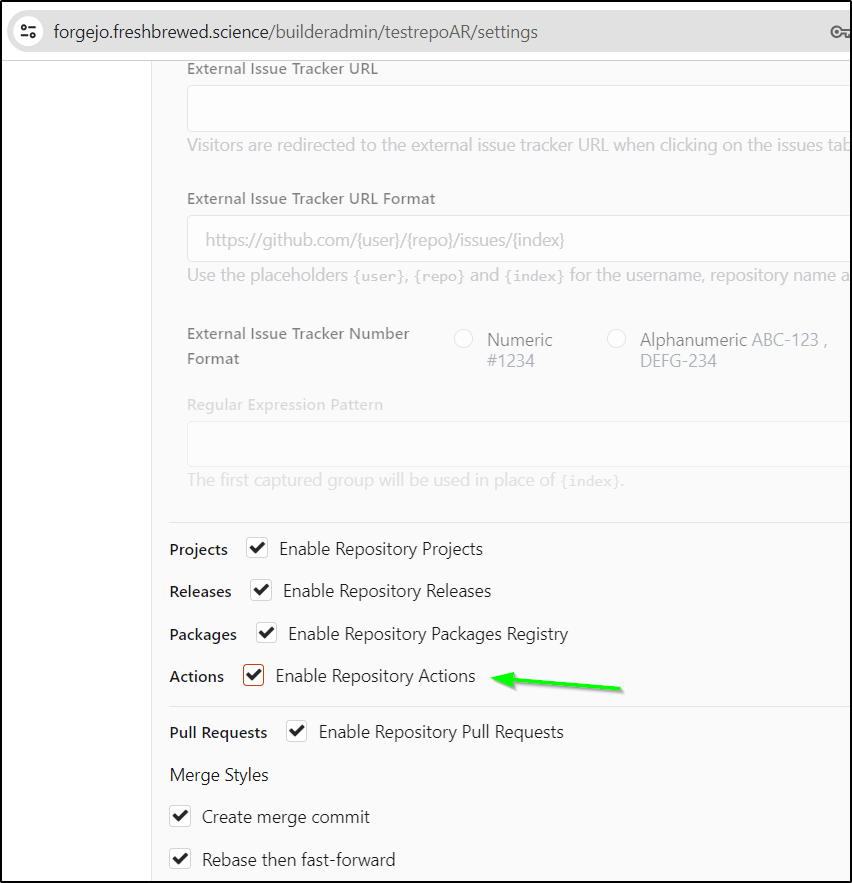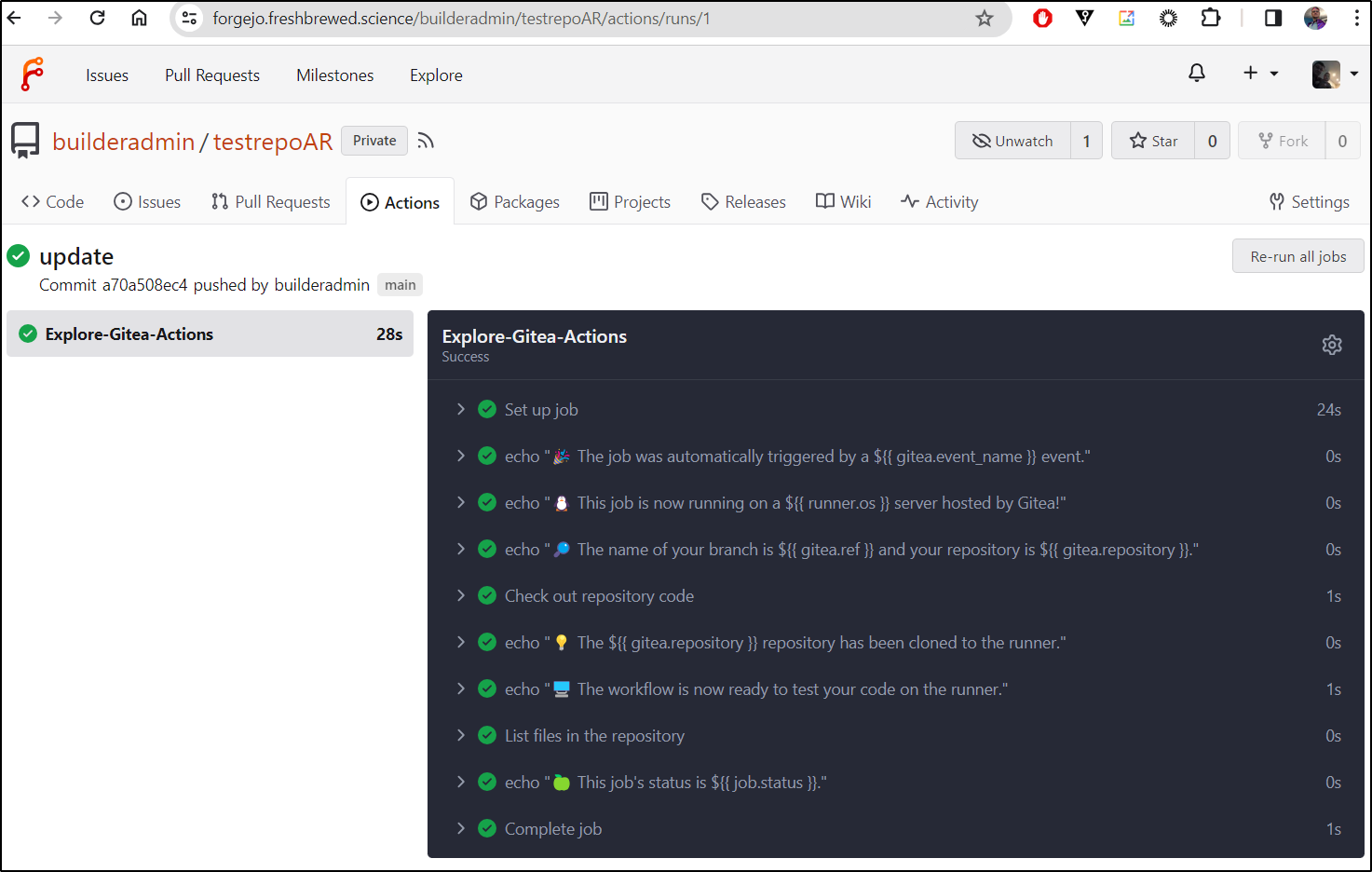Published: Mar 28, 2024 by Isaac Johnson
With a new cluster comes the need to create a new Github action runner controller. The new method is using an “ARC” setup that can scale to 0.
We’ll start with the traditional runners as this will unblock our workflows and is a more common pattern.
In this writeup we will also cover Azure DevOps, Forgejo and Gitea.
Helm setup
Before we can setup a RunnerDeployment we need the Actions Controller and CRDs.
$ helm repo add actions-runner-controller https://actions-runner-controller.github.io/actions-runner-controller
"actions-runner-controller" has been added to your repositories
$ helm repo update
Hang tight while we grab the latest from your chart repositories...
...Successfully got an update from the "actions-runner-controller" chart repository
...Successfully got an update from the "openfunction" chart repository
...Successfully got an update from the "backstage" chart repository
...Successfully got an update from the "spacelift" chart repository
...Successfully got an update from the "sonatype" chart repository
...Successfully got an update from the "gitea-charts" chart repository
...Successfully got an update from the "harbor" chart repository
...Successfully got an update from the "datadog" chart repository
...Successfully got an update from the "jetstack" chart repository
...Successfully got an update from the "openproject" chart repository
...Successfully got an update from the "frappe" chart repository
...Successfully got an update from the "ananace-charts" chart repository
...Successfully got an update from the "deliveryhero" chart repository
...Successfully got an update from the "bitnami" chart repository
Update Complete. ⎈Happy Helming!⎈
I’ll need to fetch a Github token
$ export GHPAT=`getpass.sh GHRunnerPAT idjakv | tr -d '\n'`
$ helm upgrade --install --namespace actions-runner-system --create-namespace\
--set=authSecret.create=true\
--set=authSecret.github_token="$GHPAT"\
--wait actions-runner-controller actions-runner-controller/actions-runner-controller
Release "actions-runner-controller" does not exist. Installing it now.
NAME: actions-runner-controller
LAST DEPLOYED: Mon Mar 4 18:58:01 2024
NAMESPACE: actions-runner-system
STATUS: deployed
REVISION: 1
TEST SUITE: None
NOTES:
1. Get the application URL by running these commands:
export POD_NAME=$(kubectl get pods --namespace actions-runner-system -l "app.kubernetes.io/name=actions-runner-controller,app.kubernetes.io/instance=actions-runner-controller" -o jsonpath="{.items[0].metadata.name}")
export CONTAINER_PORT=$(kubectl get pod --namespace actions-runner-system $POD_NAME -o jsonpath="{.spec.containers[0].ports[0].containerPort}")
echo "Visit http://127.0.0.1:8080 to use your application"
kubectl --namespace actions-runner-system port-forward $POD_NAME 8080:$CONTAINER_PORT
I need to apply a secret that will have my secrets for copying to S3. The rest is straightforward
$ cat DONTADDaddMyRunner.yml
---
apiVersion: v1
kind: Secret
metadata:
name: awsjekyll
type: Opaque
data:
PASSWORD: xxxxxxxxxxxxxxxxxxxxxxxxxxxx
USER_NAME: xxxxxxxxxxxxxxxxxxxxxxxxxxxx
---
apiVersion: actions.summerwind.dev/v1alpha1
kind: RunnerDeployment
metadata:
name: my-jekyllrunner-deployment
spec:
template:
spec:
repository: idjohnson/jekyll-blog
image: harbor.freshbrewed.science/freshbrewedprivate/myghrunner:1.1.16
imagePullSecrets:
- name: myharborreg
imagePullPolicy: IfNotPresent
dockerEnabled: true
env:
- name: AWS_DEFAULT_REGION
value: "us-east-1"
- name: AWS_ACCESS_KEY_ID
valueFrom:
secretKeyRef:
name: awsjekyll
key: USER_NAME
- name: AWS_SECRET_ACCESS_KEY
valueFrom:
secretKeyRef:
name: awsjekyll
key: PASSWORD
labels:
- my-jekyllrunner-deployment
---
apiVersion: actions.summerwind.dev/v1alpha1
kind: HorizontalRunnerAutoscaler
metadata:
name: my-jekyllrunner-deployment-autoscaler
spec:
# Runners in the targeted RunnerDeployment won't be scaled down for 5 minutes instead of the default 10 minutes now
scaleDownDelaySecondsAfterScaleOut: 300
scaleTargetRef:
name: my-jekyllrunner-deployment
minReplicas: 1
maxReplicas: 3
metrics:
- type: PercentageRunnersBusy
scaleUpThreshold: '0.75'
scaleDownThreshold: '0.25'
scaleUpFactor: '2'
scaleDownFactor: '0.5'
$ kubectl apply -f ./DONTADDaddMyRunner.yml
secret/awsjekyll created
runnerdeployment.actions.summerwind.dev/my-jekyllrunner-deployment created
horizontalrunnerautoscaler.actions.summerwind.dev/my-jekyllrunner-deployment-autoscaler created
And I can see it working
While I tried using my new 2.0.0 image I used with new ARC, it failed on the old
Azure DevOps
I added the helm repo
$ helm repo add nevertheless.space https://gitlab.com/api/v4/projects/24399618/packages/helm/stable
"nevertheless.space" has been added to your repositories
$ helm repo update
Hang tight while we grab the latest from your chart repositories...
...Successfully got an update from the "spacelift" chart repository
...Successfully got an update from the "openfunction" chart repository
...Successfully got an update from the "backstage" chart repository
...Successfully got an update from the "actions-runner-controller" chart repository
...Successfully got an update from the "nevertheless.space" chart repository
...Successfully got an update from the "sonatype" chart repository
...Successfully got an update from the "gitea-charts" chart repository
...Successfully got an update from the "harbor" chart repository
...Successfully got an update from the "openproject" chart repository
...Successfully got an update from the "jetstack" chart repository
...Successfully got an update from the "datadog" chart repository
...Successfully got an update from the "frappe" chart repository
...Successfully got an update from the "ananace-charts" chart repository
...Successfully got an update from the "deliveryhero" chart repository
...Successfully got an update from the "bitnami" chart repository
Update Complete. ⎈Happy Helming!⎈
Then I can set some values
$ cat azdo.values.yaml
replicaCount: 1
azureDevOps:
url: "https://dev.azure.com/princessking"
pool: "K8s-onprem-int33"
pat: "xxxxxxxxxxxxxxxxxxxxxxxxxxxxxxxxxxxxxxxxxxx"
workingDir: "_work"
statefulSet:
enabled: false
storageClassName: "default"
storageSize: "20Gi"
limits:
enabled: false
requestedMemory: "128Mi"
requestedCPU: "250m"
memoryLimit: "1Gi"
CPULimit: "1"
nodeSelector:
enabled: false
key: "kubernetes.io/hostname"
value: "eu-central-1.10.11.10.2"
Then install with helm
$ helm install -f azdo.values.yaml --namespace="azdo" --create-namespace "azdo" nevertheless.space/azuredevops-agent --version="1.2.0"
NAME: azdo
LAST DEPLOYED: Mon Mar 4 20:47:56 2024
NAMESPACE: azdo
STATUS: deployed
REVISION: 1
TEST SUITE: None
We can now see it running
$ kubectl get pods -n azdo
NAME READY STATUS RESTARTS AGE
azdo-76d4c64969-bhr8b 1/1 Running 0 95s
and I can see it listed now
Now I can test
And I can test with a quick bash step
Forgejo Runner
I first need to create a token
I can then pull the latest chart from codeberg
$ helm pull oci://codeberg.org/wrenix/helm-charts/forgejo-runner
Pulled: codeberg.org/wrenix/helm-charts/forgejo-runner:0.1.9
Digest: sha256:7d70a873ca26b312bafcbf24368e8db3f9fedebe2d2556357a42c550c09e6959
I can then install while passing the instance name, token and scaling details
$ helm install -n forgejo --create-namespace forgejo-runner-release \
--set runner.config.instance='https://forgejo.freshbrewed.science' \
--set runner.config.token=3H4KucADI4hnLHISHd9DR8VpPAmJo69jDTTezqnM \
--set runner.config.name='int33-kubernetes' \
--set autoscaling.minReplicas=1 \
--set autoscaling.maxReplicas=3 \
--set autoscaling.enabled=true \
oci://codeberg.org/wrenix/helm-charts/forgejo-runner
This timed out
$ helm install -n forgejo --create-namespace forgejo-runner-release \
--set runner.config.instance='https://forgejo.freshbrewed.science' \
--set runner.config.token=3H4KucADI4hnLHISHd9DR8VpPAmJo69jDTTezqnM \
--set runner.config.name='int33-kubernetes' \
--set autoscaling.minReplicas=1 \
--set autoscaling.maxReplicas=3 \
--set autoscaling.enabled=true \
oci://codeberg.org/wrenix/helm-charts/forgejo-runner
Pulled: codeberg.org/wrenix/helm-charts/forgejo-runner:0.1.9
Digest: sha256:7d70a873ca26b312bafcbf24368e8db3f9fedebe2d2556357a42c550c09e6959
Error: INSTALLATION FAILED: failed pre-install: 1 error occurred:
* timed out waiting for the condition
But I did see things creating
$ kubectl get pods -n forgejo
NAME READY STATUS RESTARTS AGE
forgejo-redis-cluster-1 1/1 Running 0 26h
forgejo-redis-cluster-2 1/1 Running 0 26h
forgejo-redis-cluster-0 1/1 Running 0 26h
forgejo-556468bc5c-xhqt7 1/1 Running 0 25h
forgejo-runner-release-config-generate-f4vzc 0/2 ContainerCreating 0 8m53s
However, I seemed to get stuck
Events:
Type Reason Age From Message
---- ------ ---- ---- -------
Normal Scheduled 15s default-scheduler Successfully assigned forgejo/forgejo-runner-release-config-generate-ld8sq to hp-hp-elitebook-850-g2
Warning FailedMount 0s (x6 over 15s) kubelet MountVolume.SetUp failed for volume "runner-data" : secret "forgejo-runner-release-config" not found
Using a Gitea chart
$ helm repo add vquie https://vquie.github.io/helm-charts
"vquie" has been added to your repositories
$ helm repo update
Hang tight while we grab the latest from your chart repositories...
...Successfully got an update from the "vquie" chart repository
...Successfully got an update from the "actions-runner-controller" chart repository
...Successfully got an update from the "backstage" chart repository
...Successfully got an update from the "openfunction" chart repository
...Successfully got an update from the "spacelift" chart repository
...Successfully got an update from the "sonatype" chart repository
...Successfully got an update from the "nevertheless.space" chart repository
...Successfully got an update from the "openproject" chart repository
...Successfully got an update from the "jetstack" chart repository
...Successfully got an update from the "gitea-charts" chart repository
...Successfully got an update from the "harbor" chart repository
...Successfully got an update from the "datadog" chart repository
...Successfully got an update from the "frappe" chart repository
...Successfully got an update from the "ananace-charts" chart repository
...Successfully got an update from the "deliveryhero" chart repository
...Successfully got an update from the "bitnami" chart repository
Update Complete. ⎈Happy Helming!⎈
Then launching the helm
$ helm install act-runner -n forgejo --set act_runner.storageclass="local-path" --set act_runner.instance="https://forgejo.freshbrewed
.science" --set act_runner.token=3H4KucADI4hnLHISHd9DR8VpPAmJo69jDTTezqnM vquie/act-runner
NAME: act-runner
LAST DEPLOYED: Mon Mar 4 21:40:18 2024
NAMESPACE: forgejo
STATUS: deployed
REVISION: 1
TEST SUITE: None
And I can see it running
$ kubectl get pods -n forgejo
NAME READY STATUS RESTARTS AGE
forgejo-runner-release-config-generate-ld8sq 0/2 ContainerCreating 0 21h
act-runner-f657f4cb-tq2bq 2/2 Running 0 20h
forgejo-redis-cluster-0 1/1 Running 0 12h
forgejo-redis-cluster-1 1/1 Running 0 12h
forgejo-redis-cluster-2 1/1 Running 0 12h
forgejo-798c6f4f4b-fxq6p 1/1 Running 0 11h
I have to admit I did a dumb thing. While testing, i errantly cleaned up what I thought was a bad Action Runner and managed to dump the whole Forgejo system. I had not made that many changes, but it was another illustration about why it’s important to sync to external systems for safety.
Gitea
This leads me to my respin of Gitea.
I had an active, albeit unused Gitea on my Dockerhost (192.168.1.100).
I just needed to expose it with an external endpoint and ingress
$ cat gitea.yaml
apiVersion: networking.k8s.io/v1
kind: Ingress
metadata:
annotations:
cert-manager.io/cluster-issuer: letsencrypt-prod
kubernetes.io/ingress.class: nginx
kubernetes.io/tls-acme: "true"
nginx.ingress.kubernetes.io/proxy-read-timeout: "3600"
nginx.ingress.kubernetes.io/proxy-send-timeout: "3600"
nginx.org/websocket-services: gitea-external-ip
labels:
app.kubernetes.io/instance: giteaingress
name: giteaingress
spec:
rules:
- host: gitea.freshbrewed.science
http:
paths:
- backend:
service:
name: gitea-external-ip
port:
number: 80
path: /
pathType: ImplementationSpecific
tls:
- hosts:
- gitea.freshbrewed.science
secretName: gitea-tls
---
apiVersion: v1
kind: Service
metadata:
annotations:
name: gitea-external-ip
spec:
clusterIP: None
clusterIPs:
- None
internalTrafficPolicy: Cluster
ipFamilies:
- IPv4
- IPv6
ipFamilyPolicy: RequireDualStack
ports:
- name: giteap
port: 80
protocol: TCP
targetPort: 4220
sessionAffinity: None
type: ClusterIP
---
apiVersion: v1
kind: Endpoints
metadata:
annotations:
name: gitea-external-ip
subsets:
- addresses:
- ip: 192.168.1.100
ports:
- name: giteap
port: 4220
protocol: TCP
$ kubectl apply -f ./gitea.yaml
I then will create a new Organization
This will be used for backups, so I’ll call it ‘ForgejoBackups’
I then created the Repo
I now have a URL
Now, back in Forgejo, I can set a remote mirror
I then synced it
And we can see it synced
In testing actions, make sure to enable actions on a test repo
I added a quick runner test
$ cat .gitea/workflows/demo.yaml
name: Gitea Actions Demo
run-name: $ is testing out Gitea Actions 🚀
on: [push]
jobs:
Explore-Gitea-Actions:
runs-on: ubuntu-latest
steps:
- run: echo "🎉 The job was automatically triggered by a $ event."
- run: echo "🐧 This job is now running on a $ server hosted by Gitea!"
- run: echo "🔎 The name of your branch is $ and your repository is $."
- name: Check out repository code
uses: actions/checkout@v3
- run: echo "💡 The $ repository has been cloned to the runner."
- run: echo "🖥️ The workflow is now ready to test your code on the runner."
- name: List files in the repository
run: |
ls $
- run: echo "🍏 This job's status is $."
Then pushed it up
builder@LuiGi17:~/Workspaces/testrepoAR$ vi .gitea/workflows/demo.yaml
builder@LuiGi17:~/Workspaces/testrepoAR$ git status
On branch main
Your branch is up to date with 'origin/main'.
Untracked files:
(use "git add <file>..." to include in what will be committed)
.gitea/
nothing added to commit but untracked files present (use "git add" to track)
builder@LuiGi17:~/Workspaces/testrepoAR$ git add .gitea/
builder@LuiGi17:~/Workspaces/testrepoAR$ git status
On branch main
Your branch is up to date with 'origin/main'.
Changes to be committed:
(use "git restore --staged <file>..." to unstage)
new file: .gitea/workflows/demo.yaml
builder@LuiGi17:~/Workspaces/testrepoAR$ git commit -m update
[main a70a508] update
1 file changed, 19 insertions(+)
create mode 100644 .gitea/workflows/demo.yaml
builder@LuiGi17:~/Workspaces/testrepoAR$ git push
Enumerating objects: 6, done.
Counting objects: 100% (6/6), done.
Delta compression using up to 16 threads
Compressing objects: 100% (3/3), done.
Writing objects: 100% (5/5), 795 bytes | 795.00 KiB/s, done.
Total 5 (delta 0), reused 0 (delta 0), pack-reused 0
remote: . Processing 1 references
remote: Processed 1 references in total
To https://forgejo.freshbrewed.science/builderadmin/testrepoAR.git
0ceb65b..a70a508 main -> main
Which worked
Summary
We covered a lot of things in this writeup including Github Runners, Azure DevOps agents and restoration of Forgejo. We included forwarding traffic to a containerized Gitea. After learning a lesson about running kubectl delete when tired, I setup push mirrors to the containerized Gitea for all new repos. Lastly, I did a quick test of Gitea actions.


